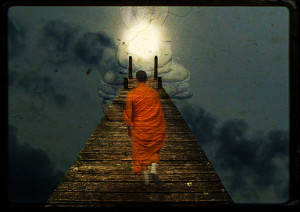
There are many ways to define spirituality.
Have you ever tried to define spirituality? If you have chances are it got fairly murky fairly quickly. As we discuss regularly on this blog, spirituality means something different to everyone. No matter how much we try to quantify, measure, or define spirituality, there will always be a subjective element to it.
Are there any commonalities that everyone’s definition of spirituality share? Probably not, but that doesn’t have to stop us from constantly striving to find what’s at the root of spirituality.
Mastin Kipp recently had an article published on the Huffington post Spirituality blog that attempted to bring the spirituality’s core into focus. Kipp agrees that spirituality is almost impossible define, but he has a very simple way of spotting it. The tell tale sign? Love. Kipp argues that doing certain things from religious rituals to yoga won’t necessarily help us achieve a higher purpose or higher self. Living in an Ashram in India won’t bring you closer to your spiritual side if the essential ingredient is missing. Kipp implies that many people who are seeking a spiritual life may be looking for the easy route rather than letting their actions bring them closer to a higher level of existence.
Much like buying an expensive juice diet rather than eating healthy and exercising, some people look to achieve spirituality by cross off a series of spiritual checkboxes rather than doing the heavy lifting which will actually bring them what they desire. Focusing on incorporating love into your daily interactions can help you feel like you are living a more fulfilling life.
Are We Ready to Merge Science and Spirituality?
The dichotomy of science and spirituality is ever present in our daily lives. From the latest political debates about creationism in the classroom to Neil DeGrasse Tyson’s Cosmos, the tension is all around us. NPR’s Marcelo Gleiser wonders, does it have to be that way?
In a recent post, Gleiser argues for bringing science and spirituality together in harmony. The rigidity of both sides can be detrimental to greater understanding. The idea that science and spirituality are mutually exclusive not only leads to and unproductive standstill in thought, it also shapes our ideas about the natural world and the universe as a whole.
In his post, Gleiser quotes Lucretius, a Roman poet writing during the time of Julius Caesar. Many in his time, as in ours, felt that the mysteries of the universe and the sinking feeling that comes with the human realization of the miniscule part we are here to play could only be resolved through faith in the divine. Lucretius eloquently refutes this idea when he says:
“This dread and darkness of the mind cannot be dispelled by the sunbeams, the shining shafts of the day, but only by an understanding of the outward form and inner workings of nature.”
Essentially what Lucretius is saying is that we cannot rely on divine revelations to understand our world and our place in it. The only path to understanding and inner peace is by continuing to try and understand who we are using the information available to us.
Gleiser’s thesis is that through an almost religious dedication to gaining scientific knowledge, we can achieve a higher purpose and sense of being. While that may be true, we can take it a step further.
One of the ironies of the debate between science and spirituality is that both schools are trying to arrive at the same conclusion and are simply coming from opposite directions. In other words, spirituality accepts some kind of divine and seeks to become closer with it to achieve another level of understanding, while science uses physical evidence to uncover answers to those same mysteries.
In some ways you can think of the mysteries of the universe as a math problem. Spirituality helps lead us right to the answer while science seeks to show the work.
